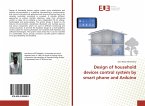This study examines the effective design and
prototype development of a robotic end effector to
assist individuals with door opening disabilities.
A robotic end effector for opening doors will allow
home robots access and freedom to move about the
home and aid those individuals who have difficulty
operating door knobs and handles. For an assistive
in-home robot, manipulating objects around the home
is of high importance. However, such a device must
come at low cost and simplicity in order to make it
accessible to a large number of disabled
individuals. This study examines the development of
a simple end effector for opening doors. The study
culminated in the development of an end effector
that can effectively grasp and manipulate a variety
of door knobs and handles. The results of this
project show that it is possible to develop an
simple, light weight, under-actuated robotic end
effector that is capable of dexterous manipulation
of more than one specific object geometry.
prototype development of a robotic end effector to
assist individuals with door opening disabilities.
A robotic end effector for opening doors will allow
home robots access and freedom to move about the
home and aid those individuals who have difficulty
operating door knobs and handles. For an assistive
in-home robot, manipulating objects around the home
is of high importance. However, such a device must
come at low cost and simplicity in order to make it
accessible to a large number of disabled
individuals. This study examines the development of
a simple end effector for opening doors. The study
culminated in the development of an end effector
that can effectively grasp and manipulate a variety
of door knobs and handles. The results of this
project show that it is possible to develop an
simple, light weight, under-actuated robotic end
effector that is capable of dexterous manipulation
of more than one specific object geometry.








